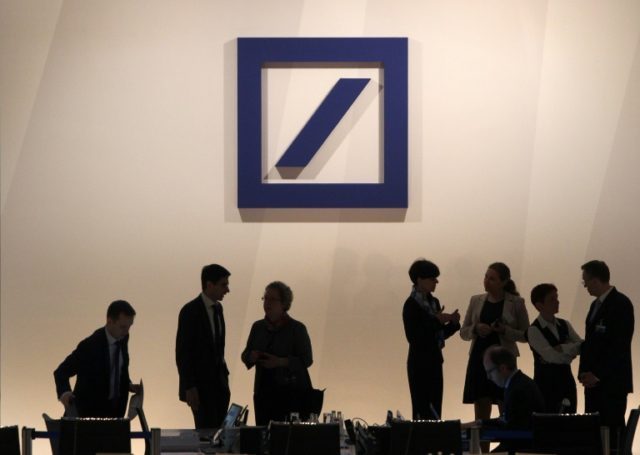Washington (AFP) – European banks’ weakness looms large on the horizon as threat to global financial system, with thin margins and an unsafe share of poor quality loans, the IMF said Wednesday.
The International Monetary Fund’s review of the health of the world’s financial system came as global investor jitters persisted over the fate of Deutsche Bank, Germany’s largest but capital-weak and troubled lender.
Dangers in the near-term have lessened since April, according the Fund, as commodity and asset prices rise and markets adjust to the shocks of Britain’s vote to secede from the European Union.
But trouble is brewing in the medium-term, according to the global crisis lender, which said that more broadly, banks, retirement funds and insurance companies needed to clean their portfolios and adjust to an era of low growth and low rates.
In advanced economies, 25 percent of banks, holding $11.7 trillion in assets, would remain weak even in a cyclical recovery. The solvency of many life insurance companies and pension funds is threatened by the prolonged period of low interest rates intended to stimulate recovery from the Great Recession.
Weak credit demand in advanced economies, in addition to low rates, is also hindering profitability, according to the IMF.
“Since the start of the year, the market capitalization of advanced economy banks has fallen by almost $430 billion, increasing the challenge of addressing banking system vulnerabilities, particularly for weaker European banks,” the report said.
Bank balance sheets are significantly stronger than before the global financial crisis, but returns on assets have only partially recovered, with eurozone lenders reaping less than half their average profits of 2004-2006, according to the IMF.
Banks will have to adjust by shedding long-standing problem loans, adapting to new regulations and updating business models, it said, adding that nonperforming loans and drags on profit required “urgent and comprehensive action.”
“In some cases, weak banks will have to exit and banking systems will have to shrink,” it said.
Facing billions in US settlement costs over its sales of toxic mortgage-backed securities, Deutsche Bank this year has seen its shares in New York fall by more than 40 percent, in large part on fears for the health of a bank that has repeatedly failed stress tests.
Japanese banks are expanding overseas due to thin margins and weak demand at home. But they face risks in their supply of dollars in doing so, according the IMF. Low rates have likewise imperiled the solvency of insurers and pension funds.
The Fund reiterated a warning it made last year that the insurance industry’s systemic risk was increasing, noting that a “double-hit” of low rates and market shocks could damage market confidence, “possibly triggering contagion to the broader financial sector.”

COMMENTS
Please let us know if you're having issues with commenting.